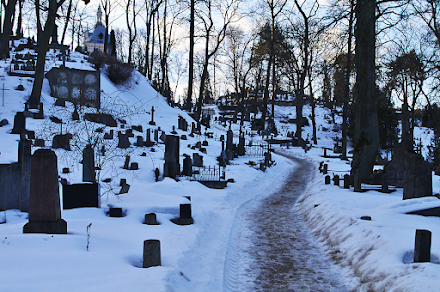Does the wheel of fortune then will continue past death?

For a long time, I believed death was ultimately a moment of freedom: I die, and I no longer worry about what I’ll do tomorrow. I free myself from everything, including time.
But reflecting on this theme - explored by Aristotle and others (Pindar, Dante Alighieri, and more) - I am no longer so certain.Is there a possibility of a tie, a nexus, a liaison between the living and the dead? Can the dead be affected by events in the world of the living, and vice versa?
Even Aristotle does not dismiss this idea:ἔοικε γὰρ ἐκ τούτων εἰ καὶ διικνεῖται πρὸς αὐτοὺς ὁτιοῦν, εἴτ᾽ ἀγαθὸν εἴτε τοὐναντίον, ἀφαυρόν τι καὶ μικρὸν ἢ ἁπλῶς ἢ ἐκείνοις εἶναι, εἰ δὲ μή, τοσοῦτόν γε καὶ τοιοῦτον ὥστε μὴ ποιεῖν εὐδαίμονας τοὺς μὴ ὄντας μηδὲ τοὺς ὄντας ἀφαιρεῖσθαι τὸ μακάριον.
(Nic. Eth. 1101b)
"For it seems, from these things, that even if anything whatsoever reaches them - whether good or the opposite - it is something feeble and small, either in itself or for them; and if not, then it is of such quantity and quality as neither to make the unhappy happy, nor to take away blessedness from those who are happy."
Thus, something endures in the relationship between the living and the dead after an individual’s demise.
Perhaps what sustains this bond, the quality of this connection, is the legacy the deceased leaves as a reminder of themselves to the living. The true quality of life is often revealed only at the end of an individual’s existence.
Death frequently unveils the authentic face of a person’s life—unexpected inheritances, love children, hidden double lives. Thus, Solon’s phrase, cited by Aristotle, resonates:οὖν οὐδ᾽ ἄλλον οὐδένα ἀνθρώπων εὐδαιμονιστέον ἕως ἂν ζῇ, κατὰ Σόλωνα δὲ χρεὼν τέλος ὁρᾶν (Nic. Eth. 1100a)
"Should no other human being be called happy while he is still alive, because according to Solon, must we look to the end".Many revelations can surface after a person’s death, altering the image we held of them.
Let us now consider Aristotle’s reflections on the influence of the living upon the dead as evidence of an implicit connection between life and death, following this proposition: There is no death without life, and no life without death. As with green and red, which share an implicit connection through "colour," So too do life and death intertwine.
At this point, why should we exclude a priori the possibility that the fate of the living might influence the state of the dead (and vice versa), given this profound connection between life and death?Most philosophers who have addressed the problem of death have considered it almost exclusively as "the death of the other." None has explored it as a continuity and relation between life and death, or death and life. Yet, as stated, there is no death without life, and no life without death.
Only the language of poetry (Pindar, Dante Alighieri, Anton Chekhov) and Aristotle have sought to perceive this relationship between the living and the dead.Dante Alighieri offers compelling examples. Notably, in Inferno (X, 77-78), Farinata degli Uberti is so concerned with Florence’s political situation that its outcome torments him more than his suffering in Hell:
S’elli han quell’arte», disse, «male appresa,
ciò mi tormenta più che questo letto.If [...] they have that art," he said, "not learned aright,
That more tormenteth me, than doth this bed.
Likewise, Pindar in Olympian 14 presents this idea of a liaison between the living and the dead, a concept echoed by Aristotle and Dante.
Go now, Echo, to the black wallsOf Persephona's houseAnd bring the fine news to his father;See Kleodamos and tell himHow his son In the famous valleys of PythoHas crowned his young hairWith the wings of a glorious triumph
Anton Chekov, in Three Sisters
In two or three hundred years’ time, or a thousand, say – it doesn’t matter how long – a new, happy life will dawn. Of course, we shan’t be a part of that life, but we’re living and working towards it now, suffering, indeed, to create it, and that’s the whole point of our existence, that’s our happiness, if you like.
Why, then, should Aristotle’s statement about the nexus between the living and the dead not be true? Why should the poets’ emphasis, conveyed through their essential, sentimental and seizing language, more capable than philosophy of capturing such truth, be dismissed?
Of course, this aligns with modern philosophy’s tendency to exclude the supernatural from every aspect of human life.
Published on September 26, 2025 08:42
No comments have been added yet.



